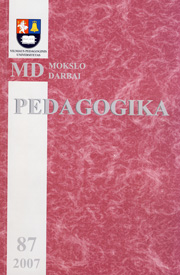Matematikos pamokose mokytojų taikomi mokymo(si) būdai ir jų efektyvumas
Teaching and Learning Methods and their Efficiency in Mathematics Lessons
Author(s): Viktorija Sičiūnienė, Nijolė CibulskaitėSubject(s): Education
Published by: Vytauto Didžiojo Universitetas
Keywords: the mathematic lesson; teaching and learning methods; sixth and tenth formers;
Summary/Abstract: The lesson is the basic form of teaching mathematics. Such issues as the efficient lesson, pupils' activities in different parts of a lesson, pupils and their teachers' attitude to teaching and learning methods as well as pupils' learning result, are analyzed in the article. The data of the national pupil achievement research have been used for this analysis. 2033 sixth-formers and 1923 tenth-formers and their mathematics teachers took part in this research which was fulfilled in May 2006. It has been observed that mathematics teachers usually use different teaching and learning methods in different parts of their lessons and the pupils' level of knowledge is dependent on that. The situation is similar both in sixth and tenth forms. The research has shown that better results are achieved when at the beginning of the lesson pupils are given some time to be involved into the educational process. However, this part of the lesson shouldn't indude cross-examination or written checking of pupils' homework. It is also inappropriate to begin the lesson with the introduction of some new concepts. It has been noticed that both sixth and tenthformers manage to adopt learning material better if it is provided inductively (using particular facts and examples to form general rules and principles). The key to a good level of all formers' knowledge is their teacher's understanding that a pupil must learn on his / her own as much as possible. It is vitally importam to teach pupils to analyze their mathematics textbook, to help and get acquainted students with different recourses searching for any information they need. However, the role of these factors in learning process in sixth and tenth forms is slightly different. Older pupils require more teachers' individual attention than younger pupils, particularly if they face any difficulties in learning mathematics. The research has also shown that better results are achieved when teachers pay enough attention to pupil creativity in applying gained knowledge to practical situations, and help their pupils combine any new experience with the previous one. The condusions of the article are valuable for mathematics teachers, institutions preparing these teachers, and the authors of mathematics textbooks.
Journal: Pedagogika
- Issue Year: 2007
- Issue No: 87
- Page Range: 93-99
- Page Count: 7
- Language: Lithuanian

